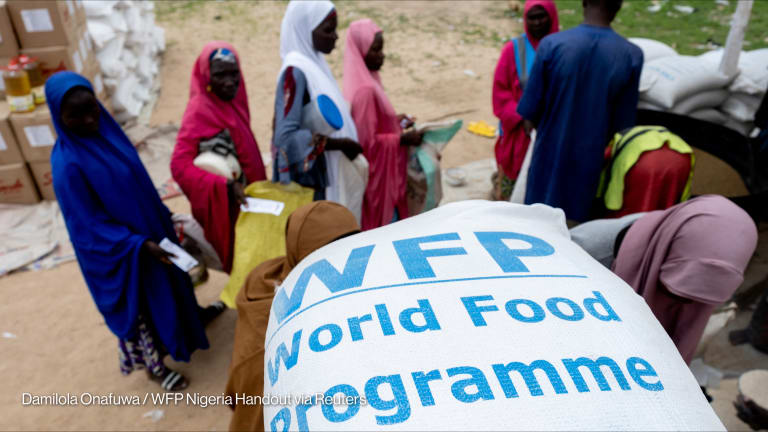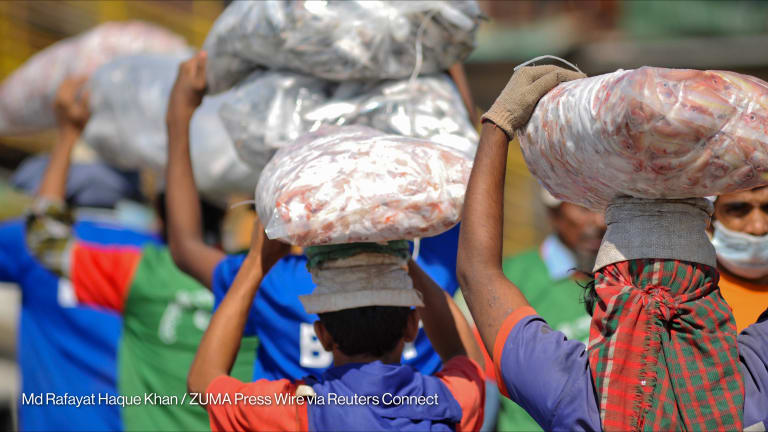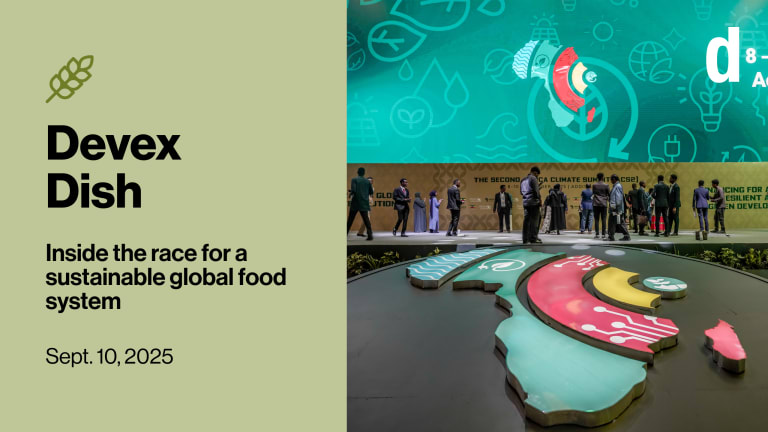
The United Nations secretary-general, U.N. agencies, governments, farmers, Indigenous people, and business leaders warned Thursday that “only nine harvests” remain for the world to reform the food system so the world’s population can be adequately fed in a way that is sustainable for people and the planet by 2030.
Get the inside track on how agriculture, nutrition, sustainability, and more are intersecting to remake the global food system in this weekly newsletter.
The virtual U.N. Food Systems Summit was held on the sidelines of the U.N. General Assembly and saw participation from groups and governments around the world seeking to instill a sense of urgency into the need to change the way the world grows, transports, and consumes food in a warming planet. Others, including some peasant and Indigenous people’s groups, sat out the event they felt did not adequately listen to the concerns of small producers.
“We are waging a war against nature — and reaping the bitter harvest. Ruined crops. Dwindling incomes. And failing food systems. Food systems also generate one-third of all greenhouse gas emissions. And they’re responsible for up to 80% of biodiversity loss. At the same time, food systems can and must play a leading role in addressing all of these challenges to realize the Sustainable Development Goals by 2030,” U.N. Secretary-General António Guterres said.
“The war on our planet must end, and food systems can help us build that peace.”
The process of organizing the UNFSS included consultations, events, and dialogues held across five action tracks, which brought together a diverse set of people across the food system working toward a common goal of improving access to nutritious, affordable food. The process considered a diverse set of issues, including sustainability, agroecology, natural disaster resilience, land tenure, and human rights.
Currently as many as 811 million people are hungry, and nearly 3 billion people find healthy diets too expensive — even though the world currently produces enough food for the entire population.
Although organizers had hoped to showcase the culmination of more than 18 months of work with an in-person gathering, the COVID-19 pandemic ultimately led to the decision to move it online. Nearly 100 officials were scheduled to deliver statements — the majority of which were prerecorded — Thursday, with additional governments speaking Friday.
The virtual nature ensured participants from all over the world could address the gathering even if they did not travel to New York for the General Assembly. But it left the process without the celebratory event many had hoped for.
Participants emphasized the work was only just beginning.
In a statement as chair of the UNFSS, Guterres said the world has no hope of achieving the SDGs if food systems are not drastically reformed to benefit people, planet, and prosperity. The work must be connected to November’s 26th U.N. Climate Change Conference of the Parties measuring progress on the Paris Climate Agreement, and requires the world to “shift and scale” public and private financing.
U.S. Agency for International Development Administrator Samantha Power and U.S. Secretary of Agriculture Tom Vilsak provided more details on the $10 billion in funding U.S. President Joe Biden announced Tuesday in his speech to the General Assembly to “end hunger and invest in the food system.” Power said half of that funding will be spent in the U.S., while the other half will be spent “fighting global food insecurity,” invested through USAID’S Feed the Future program.
“With new investments and a new strategy, Feed the Future aims to contribute to a 20% reduction in poverty and stunting in target counties over the next five years,” Power said. “But the United States cannot end hunger on its own. No country can. We need the support of foundations and food scientists, donors and development agencies, private companies and partner countries to not just feed the future but build a future where hunger is a distant memory.”
The Bill & Melinda Gates Foundation announced a commitment of a $922 million, five-year investment supporting a nutritious food system.
The vast majority of speakers at the summit did not make concrete funding announcements, but committed to measures such as youth empowerment, job creation, and supporting Indigenous people — all of which are more difficult to track as the process looks towards accountability mechanisms.
The UNFSS has an online “commitment registry” where participants can log their “commitment to action,” which will appear in the summit compendium that also includes outcomes from dialogues and action tracks. Participants and critics of the summit said that, more important than announcements, will be the ability of the global community to measure the commitments’ effectiveness.
Gates gives record $922M for nutrition, urges others to 'step up'
The Bill & Melinda Gates Foundation made its largest commitment to fighting global malnutrition at this week's U.N. Food Systems Summit in hopes of pushing other philanthropies to take "bold" action on the issue.
A coalition of groups who declined to participate in the U.N. process held an alternative summit this week, a three-day event they argued was the real “people’s summit.”
Malcolm Guy, secretary-general of the International League of Peoples' Struggle, decried “corporate concentration of power” in the UNFSS process, which he said “diluted the right to participation and decision making through the so-called multi-stakeholder approach while supposedly encouraging the participation of grassroots movement and civil society.”
But while some groups chose to stay away, others calculated participation in the summit was the best way to influence outcomes.
“We have participated in this process … because we want our voice to be heard,” Dr. Myrna Cunningham, president at the Fund for the Development of the Indigenous Peoples of Latin America and the Caribbean and member of the UNFSS advisory committee, told reporters in a briefing. “We are here today because we want joint commitments that will bring about real solutions. We are convinced that our time-tested ancestral knowledge about sustainability and harmony with nature will make contributions to this process.”
“The war on our planet must end, and food systems can help us build that peace.”
— António Guterres, secretary-general, U.N.Another member of the advisory committee, Elizabeth Nsimadala, president of the Pan-African Farmers Organizations, called the event “a true definition of what we would call a people’s summit” that has been “very inclusive.”
There were calls to bolster the Rome-based Committee on World Food Security, or CFS, which includes a Civil Society and Indigenous People’s Mechanism, and CFS Chairperson Thanawat Tiensin said the summit was an opportunity to strengthen food system governance.
Leaders of seven U.N. agencies — including the World Food Programme, UNICEF, the U.N. Development Programme, World Health Organization, and Food and Agriculture Organization — said they would work with one another and at the country level to encourage implementation of the “national pathways” developed by countries to achieve food systems transformation. International Fund for Agricultural Development President Gilbert Houngbo said his organization would work to help close the financing gap, which he called “a major challenge.”
The three Rome-based agencies — WFP, FAO, and IFAD — will lead a “coordination hub” to carry the work forward.
“Decades of intensive agriculture, whether through monocropping or factory farming, has moved farming further away from nature’s regenerative systems and is amplifying the environmental and health crisis,” U.N. Environment Programme Executive Director Inger Andersen said. “We at the United Nations Environment Programme are committed to joining up with other U.N. agencies as one U.N. in supporting countries as they arrive at and implement ambitious commitments to transform our relationship with food for people and for the planet.”









